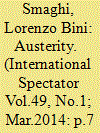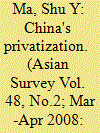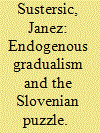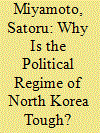| Srl | Item |
| 1 |
ID:
129942


|
|
|
|
|
| Publication |
2014.
|
| Summary/Abstract |
Policymakers in advanced economies tend to postpone reforms and budgetary adjustment, which are politically costly, until the deterioration of financial market sentiment makes these measures unavoidable. Such a strategy is economically costly and politically dangerous. It is costly because once market sentiment deteriorates confidence can be restored only through drastic and much more painful measures. Austerity can be avoided only with a credible reform agenda. The strategy is also dangerous because the argument that "there is no other alternative" cannot be repeated indefinitely by governments that fail to act earlier. The risk that citizens may be attracted to populist solutions increases.
|
|
|
|
|
|
|
|
|
|
|
|
|
|
|
|
| 2 |
ID:
082390


|
|
|
|
|
| Publication |
2008.
|
| Summary/Abstract |
A major breakthrough in China's privatization occurred in May 2005, when a "share conversion" pilot reform program was introduced. This article will situate this in the perspective of China's two-decade-long shareholding system reform. It will argue that the "share conversion" reform is part of China's long-followed gradualist transition, instead of a switch to shock therapy
|
|
|
|
|
|
|
|
|
|
|
|
|
|
|
|
| 3 |
ID:
089559


|
|
|
|
|
| Publication |
2009.
|
| Summary/Abstract |
We use EBRD transition index to classify transition countries into gradualist and orthodox reformers. When comparing this classification with records of economic and political reforms before the breakdown of socialism, an apparent historical regularity emerges. Countries where transition was to an extent »endogenous« were more likely to choose a gradualist strategy, whereas countries where a strict socialist regime was upheld until its breakdown, were more likely to decide for an orthodox »big-bang« approach to transition. Some political economy explanations for this regularity are suggested.
|
|
|
|
|
|
|
|
|
|
|
|
|
|
|
|
| 4 |
ID:
170285


|
|
|
|
|
| Summary/Abstract |
Existing research suggests that democratization can run counter to building peace in post-conflict contexts. This article analyses the effect of two competing strategies that external actors use to address the conflict of objective between democracy and peace: prioritization and gradualism. The prioritization approach advises sequencing, which means postponing support for democratization and concentrating first on peace in terms of the absence of violent conflict. The gradualist approach promotes peace and democracy simultaneously. This article offers a systematic analysis of these two prominent donor strategies. To this end, it focuses on two critical junctures in two similar post-conflict settings (Burundi and Nepal). Drawing upon extensive field research, the analysis shows that a gradualist approach is not more risk-prone than a prioritization strategy. To the contrary, the analysis suggests that even in most fragile contexts, gradualism can help to foster peace. Prioritization, in turn, may also contribute to the instability it aimed to prevent. Two factors condition the effect of the selected strategy on peace: which dimensions of democracy are affected and to what degree, and whether the institutional context reinforces or counteracts this trend.
|
|
|
|
|
|
|
|
|
|
|
|
|
|
|
|
| 5 |
ID:
045363


|
|
|
|
|
| Publication |
Berkeley, University of California Press, 1966.
|
| Description |
ix, 224p.hbk
|
|
|
|
|
|
|
|
|
|
|
|
Copies: C:1/I:0,R:0,Q:0
Circulation
| Accession# | Call# | Current Location | Status | Policy | Location |
| 002844 | 951.73/MUR 002844 | Main | On Shelf | General | |
|
|
|
|
| 6 |
ID:
161263


|
|
|
|
|
| Summary/Abstract |
This article studies Chinese central government policies in relation to food market building and food security between 1979 and 2008. It investigates major changes in the state's grain purchase pricing, urban subsidized food sales and the state monopoly over rural-to-urban food circulation that were effected in an attempt to ensure both food availability and accessibility under fiscal constraint. By observing the gradual transition from state monopoly to the market, this article traces the mechanisms which enabled the Chinese government to both establish a monopsony by generating artificial price signals for farmers to generate food output, and act as a monopolistic seller by providing subsidized low-priced food to urban consumers in order to fulfil its goal of low-cost industrialization. Thus, China's food security largely hinged on the government's budget to subsidize the price gap. The Chinese government juggled between food security and fiscal affordability to formulate a food budget that would neither excessively impact food security nor cause a crisis to government finance. China's food security puzzle was eventually worked out in the mid-2000s with the boosting of national income, which enhanced the population's access to food and eased the central government's food security concerns.
|
|
|
|
|
|
|
|
|
|
|
|
|
|
|
|
| 7 |
ID:
190458


|
|
|
|
|
| Summary/Abstract |
The purpose of this paper is to examine the stability and toughness of North Korea’s political regime from the perspective of radicalism and gradualism of the market economization. Since it is believed that gradualism keeps the regime stable. I examined the hypothesis that North Korea and Cuba effectively abandoned their socialist planned economy and introduced market economization after witnessing the economic crisis in China and Vietnam during the Cold War. As a result, North Korea and Cuba experienced the economic crisis and gradual economic development after the Cold War. The socialist planned economy remained an ideal in North Korea. Therefore, market economization became gradualism because of its suppression by the ideal in North Korea.
|
|
|
|
|
|
|
|
|
|
|
|
|
|
|
|
| 8 |
ID:
190459


|
|
|
|
|
| Summary/Abstract |
The purpose of this paper is to examine the stability and toughness of North Korea’s political regime from the perspective of radicalism and gradualism of the market economization. Since it is believed that gradualism keeps the regime stable. I examined the hypothesis that North Korea and Cuba effectively abandoned their socialist planned economy and introduced market economization after witnessing the economic crisis in China and Vietnam during the Cold War. As a result, North Korea and Cuba experienced the economic crisis and gradual economic development after the Cold War. The socialist planned economy remained an ideal in North Korea. Therefore, market economization became gradualism because of its suppression by the ideal in North Korea.
|
|
|
|
|
|
|
|
|
|
|
|
|
|
|
|